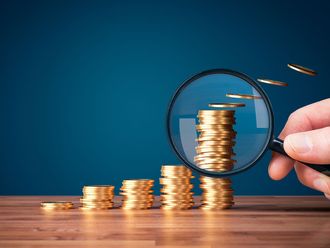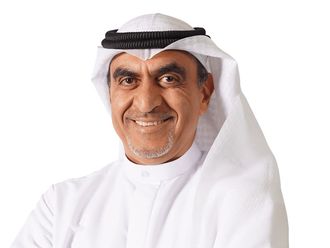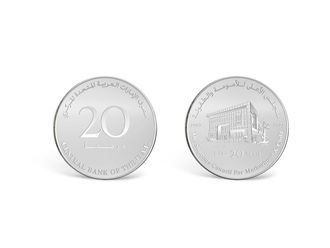Dubai: One of the first challenges the UAE faced after the union was declared, was to create a viable financial system that supported the economic ambitions of the young nation.
It involved the creation of an independent monetary authority and a financial regulator. The process began with the creation of the UAE Currency Board on May 19, 1973, through Union Law No (2) of 1973.
The Currency Board's first task was to issue a unified national currency to replace other currencies that were in circulation during the period immediately following the establishment of the federation in 1971.
Prior to the creation of the UAE dirham, the currencies in circulation included the Bahraini dinar, the Qatari and Dubai riyals. The UAE dirham was put in circulation for the first time on May 19, 1973, with a total of Dh260 million in circulation.
The Currency Board had the limited mandate to issue the national currency fully backed by gold and foreign exchange. The value of the dirham in gold stood at 0.186621 gram and was pegged to the American dollar at a rate of 3.94737 per dollar.
The first major milestone towards creating a stable, modern financial system was spelt out in Union Law No (10) of 1980, which established the UAE Central Bank with a wider mandate to reorganise the monetary and banking system.
The UAE Central Bank was a natural progression from the Currency Board which it replaced. Over the years, the institution has emerged a symbol of stability for the rapidly expanding economy.
"Following the evolution of the Currency Board into the Central Bank in 1980 the UAE has developed a world class banking system. This phenomenal growth is testament to the UAE's foresight in adopting and implementing world class standards of governance and regulation, which have attracted many of the world's leading financial institutions to the UAE and created the region's largest financial hub," said Jonathan Morris, chief executive officer of Standard Chartered UAE.
Forty years after the birth of the UAE and 38 years after the Currency Board was established to introduce a national currency, the UAE has the largest banking sector in the GCC, with total assets of $465 billion (Dh1.7 trillion).
Recent statistics show among the top 15 banks in the Arab countries ranked by assets eight of them are UAE-based, with Emirates NBD on top — way ahead of its regional peers.
Dealing with crisis
The UAE economy's integration into global financial systems resulted in new opportunities and vulnerabilities to the banking system in recent years. The recession of 2008-09 saw a sharp decline in liquidity and an excessive increase in non-performing loans.
But the prudent intervention of the government and the Central Bank helped the banking system to save itself from any systemic problems.
The UAE was among the first countries to enforce a deposit guarantee mechanism as part of emergency measures to safeguard its banking sector. The measures also included the injection of Dh120 billion into the sector by the Central Bank and the Ministry of Finance to offset post-crisis shortages.
"The government and the Central Bank were quick to act. That helped the speedy recovery of the economy and the fin-ancial sector. The UAE's banking sector has stabilised and is set to return to strong profit growth in 2012 as most banks have made provisions for the non-performing assets they accumulated during the financial crisis," said Abdul Aziz Al Ghurair, chief executive officer of Mashreq.
In the last two years, UAE banks have come a long way in de-risking and deleveraging their balance sheets. Many leading banks have reported a decline in their loan-loss provisions. While Emirates NBD's second-quarter provisions fell 18 per cent compared to the same period last year, they were down 28 per cent quarter on quarter. Abu Dhabi Commercial Bank and Mashreq also reported 28 per cent and 29 per cent declines in provisions.
Sound balance sheets
Analysts say when compared to its global peers, UAE banks have sound balance sheets, with high capital adequacy ratios exceeding Basel requirements. The IMF's recent Article IV Consultation placed the UAE in a net external creditor position well in excess of 130 per cent of GDP, among the highest in the world.
"The UAE banking system presents largely sound balance sheets, profitability and high returns on assets and equity, is strongly capitalised, with high capital adequacy ratios (close to 20 per cent, as reported by the UAE Central Bank), and banks are highly rated compared to their regional and international peers," said Dr Nasser Saidi, chief economist of the Dubai International Financial Centre.
Saidi said sound regulation helped to save local institutions from excessive exposure to toxic assets. The regulatory and prudential rules discouraged exposure to sub-investment grade investments or instruments.
Finally the role of Islamic banking and finance that is the growing compliance with Sharia tenets in financial instruments also helped the UAE financial system to ride out the global crisis.
Leading rating agencies such as Moody's and Standard and Poor's say the banks have structurally strong operating performance with funding support from the authorities and GREs, and the operating environment is supported by the country's emergence as the new financial hub of the region.
The sovereign debt crisis in Europe and a potential banking crisis in Europe and the US are unlikely to impact the financial system in the UAE and the Gulf region, said Al Ghurair recently. The regional banks, especially UAE banks, are better prepared for the fallout from Europe, he said.
‘Enough liquidity'
"This time we have enough liquidity, balance sheets are cleaner and exposure to the potential problematic assets is negligible," said Al Ghurair.
Authorities insist that the banking system of the UAE is in good shape and will be able to withstand any external shocks.
"We're quite comfortable and confident of the resilience of our banking sector. We remain always vigilant," Obaid Humaid Al Tayer, Minister of State for Financial Affairs, said after a meeting of Arab finance ministers in Abu Dhabi in early September.












